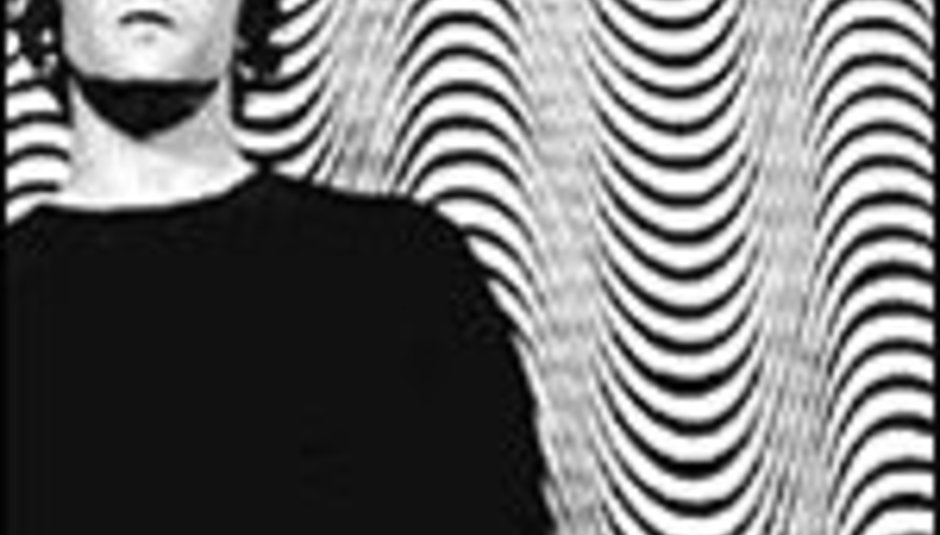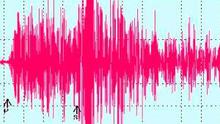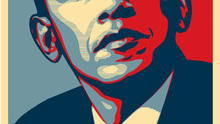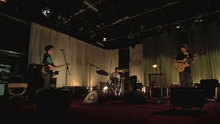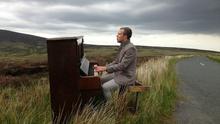So far, so unsurprising. No one familiar with Pierce’s extraordinary body of work, both as frontman of Spaceman 3 and Spiritualized, could expect anything less. It’s a balmy, Indian summer’s afternoon, and I’m sitting with Jason Pierce in the basement of a Soho bar, having just asked him if, in retrospect, he thought that he’d over-egged the orchestral pudding on ‘Let It Come Down’, Spiritualized’s lush, monumental, but deeply divisive 2001 album. The answer, of course, is a resounding ‘no’. And rightly so. Still, we're here to talk about 'Amazing Grace', the rougher, less elaborately-orchestrated follow-up. I mention how Pierce has trailered the new album as being Spiritualized’s ‘garage rock’ record?
‘I haven’t done nothing of the sort’, he interrupts, laughing. "It’s unproduced, but I don’t think that necessarily makes it garage. Somebody in Germany said that the nearest it gets to being a garage record is that we used the garage next door to the Baptist church. Garage to me is very much ‘you rehearse as best you can, you go in the studio, you press record, you get what you get and you deliver it and say ‘this is our record. This record is obsessed over. It’s not about getting a rough recording, it was about capturing these songs before anybody had actually learnt how to play them, so you get this very spontaneous immediacy in the playing. The possibilities are endless. We can take these songs anywhere. As soon as you’ve learnt to play something, a whole different set of standards kick in and what people generally learn is how not to make mistakes and how not to fuck up or how to make things easy for themselves, and this record was about capturing the moment before that set of circumstances kicked in.’
In the past you’ve been renowned as a kind of sonic perfectionist, painstakingly mixing each album and so forth. Did you find the stripped-down aspects of recording this album liberating?
‘No, because it's exactly the same, to be honest. It’s painstakingly put together in that I’ve obsessed over everything, even though it's not about production, or processing the sound, it still had to be right. This isn’t a rough attempt ‘ it’s been carefully looked at and studied and it's as perfect and as accurate as our last record was, or the record before that. This whole idea, which didn’t come from me, that it's garage, that it's knocked off, that it’s quick, is going to mislead people because that isn’t the intention. The intention is that it's very naked, very close-miked. It’s trying to record the whole physicality of the music, the squeaks of fingers on instruments and nothing gets in the way of that. But it certainly wasn’t liberating.’
The last album, ‘Let It Come Down’, was huge and lush and orchestral; is the new one a reaction against that?
‘Again, this idea that we’ve scaled down... we’ve come to this record full of the knowledge of what it was like to make the last record. We’re not trying to ignore the fact that record was put together, but I could make ten records like the last one because I know exactly how I made that. But to do that is kind of purposeless. The best music is made when you’re totally out of control and you don’t know the answers and you don’t know how it's going to work out.’
One of the best things about the new album is that it feels like a gig. Is this a good taste of what we can expect from the live shows or are you going to spring a few surprises?
‘The record’s kind of a starting point, and from now on it’s never going to remain static. It’s not about cabaret, or going through the motions. But it's good that this record is ready to run, we don’t have to deconstruct it or figure out how it's going to work live, because we captured the moment of the birth of these songs on the record, so there’s everywhere to go now with it.’
The first two albums in particular were high on very textured, drone-based, electronic music, almost ambient in places. Since then you’ve moved further and further away from that. Was it a conscious decision of yours or was it a matter of adapting to the strengths of the new band?
‘On the last record, I was more interested in what the French horns were going to be playing than what the band was going to be playing and that suited the fact that the band was new at that time. It was all about the orchestrations. But maybe I like my own music a bit leaner. Once you take out a lot of the instrumentation, you leave space for people to play their sound into and I think that’s become more important. The more red-hot this current band gets, then the more space you allow for them to perform in, and that’s always going to be better.’
A lot of the more upbeat songs on the first couple of records ‘ ‘I Want You’, ‘Lay Back In The Sun’, ‘200 Bars’, ‘If I Were With Here Now’ ‘ were very poppy, almost bubblegum in places. Since then, you’ve tended towards heavier, more cacophonous rock songs. What caused that shift?
‘I don’t really know where this line is drawn. In a way, there’s kind of a thread that runs through all my music. I Want You isn’t radically different from Electricity or Let It Come Down or the 12 Steps. I haven’t changed hugely from how I was 15 years ago to how I am now’ still, they could all have been produced in an identical manner, but that wouldn’t have been anywhere near as interesting. I do understand that the very nature of being a fan of something is general very conservative, in that it's very hard to meet a fan of radical change, like ‘I like different fucking weather every day!’ I accept that, and I can’t cater for anyone who loves what we do ‘ I’m quite happy to leave people way back with ‘Lazer Guided Melodies’ or ‘Ladies and Gentlemen We Are Floating In Space’, but to expect me to remain there with them is kind of dumb.’
You got to collaborate with Dr John on ‘Cop Shoot Cop’’ is there anyone else you’d really like to get on a Spiritualized record?
‘Not really, it’s all circumstantial. ‘Cop Shoot Cop’ was something I knew he’d understand, and it was magical. I think the track was great before he came to it and it was astonishing afterwards. We played with Kenny Wheeler on ‘The Power and the Glory’ and ‘Rated X’ on the new one. He’s an astonishing trumpet player ‘ unlike most people who played alongside Miles Davis or came through that whole scene, he didn’t base his style anywhere near Miles Davis. Evan Parker also - they’re both these people who have this extraordinary talent to express themselves through their instruments, you only need to hear a note and you know exactly whose performing, and that’s a rare talent. There’s only a few people on the planet who you go ‘I know who that is, that’s their voice.’
You’re often portrayed in the media as the quintessential tortured artist ‘ and I’m sure this must bother you. What does the real Jason Pierce do when you’re not on stage, or in the studio?
Jason pauses for a minute, then answers, apparently utterly seriously. ‘I do a lot of music, I just don’t talk about it.’ Noticing my amused smile, he continues: ‘I hate this personality-driven media thing, where it's more about the people involved, and those people involved will tell you everything, starting with your favourite colour and going through to ‘What’s your opinion on this’ ‘Where you do buy your clothes’ etc’. I’m not interested in people who want to give you that much information about themselves, straight off the cuff. In most conversation, you do more listening than you do telling about yourself.’
Since the time the last record came out, it feels like the world’s changed a lot; we’ve been through two major wars in particular. A lot of your contemporaries have been particularly vocal especially with regard to the war in Iraq. Do you believe it is the place of musicians to comment on such matters, or is it something you like to step away from?
‘I think the problem is that then it becomes all about personality. If you want to make that stand, I think that’s really important. If you’re trying to sell a record on the back of that stance, I think it's kind of different, and sometimes it’s hard to draw that line between the two. You can read whole reviews of albums or live shows without them even mentioning the music; it's all about the details of personal lives or whatever, and that’s really not where I want to go.’
But surely so many of the musicians you admire, especially a lot of the classic soul singers, were overtly political; Many of them were overtly politicised simply because they were doing what they were doing in the face of such hostility. Wasn't there anything about the political aspects to the music that attracted you?
‘Yeah, but I think the main thing IS the music, because in many ways the circumstances and the politics of their lives becomes lost over time. I don’t hear music fixed to a piece of history. I don’t hear the blues and picture cotton picking in the Deep South and treat it like some kind of time capsule. I hear it according to how it relates to my life now. Even the most overtly political song can still be misread, it’s like what you write about specifically also becomes less relevant as time goes on, and people listen to the music according to how it relates to their life.’
What about the Ballad of Richie Lee (dedicated to Pierce’s close friend and lead singer of Acetone, who died in 2001)? That’s pretty specific.
‘It’s only really the title that makes that song explicit. I’ve dedicated a song to someone I loved dearly, but the song isn’t about that person specifically; to dedicate a song to someone’s life and to someone I loved like that is the most personal thing I can do.’
Although it goes as far back as Spaceman 3 and ‘Walking With Jesus’, the last few records in particular have been dominated by themes of life and death and God and heaven and hell. You always claim to be agnostic, but are you preoccupied with ideas of God, do you believe, and if so, in what?
‘No, not even slightly. But I love the music, and I love the passion and fervour of gospel music. The only real difference between pop music and gospel music is that you change the word ‘Jesus’ to ‘baby’. But the passion in the way that people who are religious sing to the Lord or sing to Jesus is overwhelming compared to how most people sing about their baby or their loved one. I love that music and I love the language of it; you can use the word Lord to change the meaning of the songs. Take ‘Lord Let It Rain On Me ‘ if you omit the word ‘Lord’ then it’s really passive and dismissive and resigned. But ‘Lord Let It Rain on Me’ is active, more aggressive. Like ‘Let It Come Down ‘ it’s like, ‘c’mon, I can deal with this!’ Everyone knows what kind of a conversation they’d be having with Jesus whether they’re religious or not.’
Pretty much every Spiritualized album is preoccupied with space in some way. I suppose I’m fortunate enough to be interviewing you just days after we’ve had an event of genuine cosmic significance. Did you get a good glimpse of Mars last week?
Jason visibly perks up. ‘No I didn’t, but I know exactly where it is and where to look’ it's not been too clear where I’ve been though. Did you see it?’
I think so, I stood out at night with a friend and we looked at what we thought was it.
‘Oh, you’d know if you saw it, it’s the biggest thing in the sky apart from the moon.’
Are you interested in astronomy in general? Are you one of these people who can name the constellations in the sky and so forth?
‘Heh, nah’ I can point and say ‘there’s a star’. But I love the whole vastness of it. I’ve no fear of it. Let it come down, I can deal with it. I like the way you can get a globe with the hemispheres reversed, so that the South pole is at the top of the world; because the concept of it being north-south-top-bottom is completely fictitious. I love the feeling that there it is, that you can go anywhere, and not have a clue about where you really are. Like we’re flying out in all directions; I mean, how good is that?’
So what next for Spiritualized? do you have any idea of the next direction the band is going to take?
‘We take it out live, this is where it gets really exciting. If you apply what I said about space, this is where we’re going, taking it out in all directions. And beyond that, who knows?’

